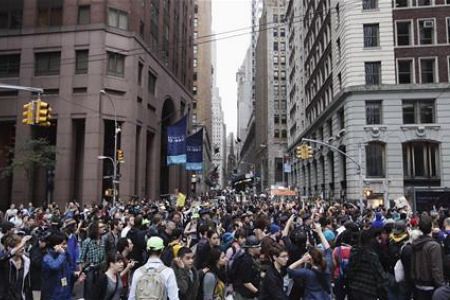
Thousands came out in defense of the Occupy Wall Street demonstrators who have been staging a sit-in at Zuccotti Park in Lower Manhattan. The City of New York backed off removing the people occupying the park since Septemmber 17., a photo by Pan-African News Wire File Photos on Flickr.
BUSINESS DAY
January Ends With Another Decline on Wall Street
By THE ASSOCIATED PRESS
JAN. 31, 2014
Investors were hit from all sides in January.
Concerns about the global economy and company earnings in the United States, as well as turmoil in emerging markets, led major indexes to their worst month in two years.
However, many remain hopeful that the problems in January will not spill over into the rest of 2014. They even see the month’s downturn as healthy, given the market’s torrid 30 percent rise last year.
The Dow Jones industrial average fell 5.3 percent in January, the worst start to a year since 2009. The Standard & Poor’s 500-stock index fell 3.6 percent in January, and the Nasdaq composite fell 2 percent.
Many investors expected 2014 to be more muddled and volatile, looking for additional pullbacks and possibly a drop of at least 10 percent in one of the market indexes, known as a correction.
“People did look at these stock market valuations at the beginning of the year with a degree of nervousness,” said David Kelly, chief market strategist at J. P. Morgan Funds. “A correction would probably be healthy for the market.”
Even so, many investors were surprised by January’s turbulence. With one exception, the Dow had triple-digit moves every trading day in January.
Investors point to the December jobs report, released on Jan. 10, as a starting point for the recent troubles. The government said then that employers created only 74,000 jobs in December, the worst month for job creation since 2011 and far below expectations. Up until that point, weeks of data showed that the economic recovery was accelerating.
“It set a negative tone for the market,” Mr. Kelly said.
Other economic reports also painted a picture of growth possibly flattening out instead of accelerating. Added to these worries were mixed signals from companies in the United States. Half of the members of the S.&P. 500 have reported, and while fourth-quarter corporate earnings are up a respectable 7.9 percent from a year earlier, companies have been cutting their full-year outlooks and reporting weaker sales, according to the data provider FactSet.
Then there are concerns about overseas markets. In China, the world’s second-largest economy, a recent report showed that manufacturing activity unexpectedly contracted in January. Then came the currency troubles in smaller emerging markets, particularly Argentina, South Africa and Turkey.
On Friday, the Dow Jones industrial average fell 149.76 points, or 0.94 percent, to 15,698.85. The S.&P. 500 dropped 11.60 points, or 0.65 percent, to 1,782.59, and the Nasdaq lost 19.25 points, or 0.47 percent, to 4,103.88.
In bond trading, the price of the benchmark 10-year Treasury note rose 14/32 to 100 29/32, and its yield fell to 2.65 percent from 2.69 percent late Thursday.
Investors should not panic yet, money managers say. More opportunities for good news abound, including next week’s jobs report for January, and another 93 members of the S.&P. 500 are scheduled to report earnings.
“A 5 percent decline in equities is not an earth-shattering event by any measure, particularly after last year,” said Krishna Memani, chief investment officer at Oppenheimer Funds. “It’s still way too early to give up on equities.”
No comments:
Post a Comment